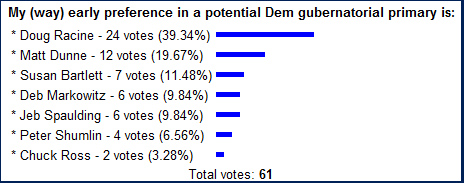I’m just gonna put it out there, and I’m not the only one thinking it:
In 2010, Vermont will elect a Democratic governor. And it will most likely be one of these people:

There. You heard it here first. It’s a different world out there now. Dems are energized by new leadership in Washington and Montpelier, clear ideological battle lines are drawn with Douglas going on a full-bore attack against education and the environment, and high profile Democratic pols are falling all over themselves to step up to the plate (there are so many names being floated, I hope they are all kicking themselves for not stepping up so early last year when they could’ve cleared the field). Despite what has been repeated of late, Douglas showed weakness in the polls last year, as his positives (still in the 60’s) deviated from his re-elect numbers (in the low 40s), suggesting that – while Vermonters still by and large like him – beyond the GOP faithful, they question whether he is the right man for the job.
So – I’ve now heard seven names being bandied about. Some may simply talking about a run, some may still only be being talked about. One has announced (Racine), one has all but announced (Markowitz), another has an active Facebook group promoting their not-yet-campaign (Spaulding). But the game’s afoot already, regardless, and the dynamic will only help draw more clear lines of policy distinction between the Governor and the Governor-wannabes – something we’d all like to see.
One could spend a lot of bandwidth breaking out the dynamics, here, and no doubt we will. Looking at the crowd which includes Sen. Doug Racine, former Sen. Matt Dunne, SoS Deb Markowitz, Sen. Peter Shumlin, Treas. Jeb Spaulding, Sen. Susan Bartlett, and Leahy State Director Chuck Ross, it’s clear the first tier of advantage in any primary is going to those who have appeared on statewide ballots in the last decade, putting Bartlett and Ross at an immediate disadvantage. It’s also clear that an earlier start equals early momentum, as nobody is rolling their eyes at the early announcement by Racine or the early gathering of support by Markowitz anymore. And if nobody’s rolling their eyes, that means the new bar is set and the clock is ticking.
A crowded primary field will likely help Racine most of all. His base in Chittenden County has only grown and solidified since his return to the Senate, and having the lion’s share of the County that holds a quarter of the state population is a huge leg up. Markowitz, also, has significant appeal among women statewide, but that advantage is compromised dramatically if Bartlett is in the race – especially given her far more extensive policy resume. Dunne maintains a significant grassroots network across the state from his recent Lt. Governor run giving him a more scalable potential campaign that could take advantage of a crowded field or a spartan one.
There are those who stand to lose from a crowded field as well. Ross may be well known within the Party infrastructure, but the party infrastructure itself won’t be enough – especially when even that insider group is fractured. Bartlett, as a first time statewide balloteer, will have an uphill climb grabbing the spotlight. At first glance, Shumlin would be at a disadvantage too among so many pols with built-in followings, but Shumlin is so good on the stump before Democratic faithful, he remains an X-factor in any contest.
Possibly the one with the most to lose in a primary is Spaulding. The argument could be made that Spaulding would be among the strongest in a general election against Douglas, or some other Republican should Douglas choose not to run as many seem to think (probably wishful thinking on their part). A lot of Spaulding’s potential A-list support would go to the likes of Racine and fellow Montpelierite Markowitz, but more significant are potential challenges within the primary voting crowd. Spaulding riles the Democratic education establishment with some abandon, and he continues to lend his name (and therefore his credibility) to efforts like the annual symposium sponsored by the conservative flagship website Vermont Tiger, which only boosts their cred in the state to Democrats’ disadvantage. Things like that stick in primary voters’ craws. Still, he has oodles of time to turn around that dynamic if he makes a conscious decision to get on top of it.
So who is serious? We’ll know sooner rather than later, as at least one Democratic committee has an invitation to all would-be Democratic Governors to show up and make their cases as early as next month. With the race already underway, those’ll be invitations that serious candidates won’t be able to ignore.
All of this early positioning makes one particular policy change all the more critical, however. The legislature must roll the primary date back earlier in the year (June?) to make primaries and primary candidates viable in November elections. More on that soon.
(I’ll leave the sidebar poll up ’til sometime Sunday.)
 Okay, I can't take it anymore.
Okay, I can't take it anymore. 
